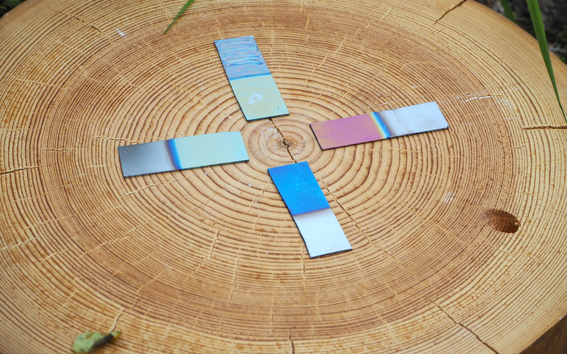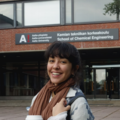Bioproducts Engineering, Master of Science (Technology)

Degree:
Application period:
Language of instruction:
Duration:
Eligibility:
Field of study:
Credits:
Organising school:
Tuition fees:
Webinar | Bioproducts Engineering
Want to hear more about the Master's Programme in Bioproducts Engineering? In this webinar the programme representatives will introduce the programme and answer your questions regarding the studies in the programme.

Description
The green transition is happening now, and the emerging specialist field of bioproducts engineering – rooted in Finland’s pulp and paper industry – is at a turning point. Bioproducts engineering needs visionaries who understand bio-based materials at the cellular level, and who use that expertise to design, manufacture and market reusable alternatives for plastics and other fossil-based materials.
In this major, you’ll learn exactly how to convert bio-based resources like wood, plants, natural fibres, and organic waste into new materials. These and other bioresources are increasingly used in materials engineering - for example in packaging and textile innovation. The possibilities for new innovations are endless.
As a Bioproducts Engineering graduate, you will be able to:
● Use wood, plant fibres and other bio-based resources to make more sustainable materials, products, and solutions. You’ll understand the structure of plant fibres at a molecular level and know how to apply that knowledge in industry. You will also learn the skills needed to engineer and run next generation biorefineries.
● Understand what circular bio-economies are and how to build and assess them. Fossil-based resources pollute the atmosphere with carbon dioxide – and they’re running out.Circular economies reduce carbon output and reuse materials and productsas part of the solution.
● Characterise biomass, polymers, fibres, raw materials and end products. You’ll learn to use spectroscopy, microscopy, colloidal and other techniques to make better renewable products.
● Design, conduct, and report research projects. You’ll graduate with strong scientific research and communication skills. This will make you a valuable asset to the cutting-edge research that’s happening in bioproducts engineering worldwide.
Replacing non-renewable products and processes with renewable ones is one of the most urgent business goals across industries today. Building an engineering career in bioproducts means solving complex sustainability challenges, making a practical impact on how new products are created and brought to market - and playing a key role in leading the green transition.
Language of instruction
In the Master’s Programme in Bioproducts Engineering, the language of instruction is English.
Tuition fees and scholarships
The tuition fee for this programme is 17,000 euros per academic year. Citizens of the European Union (EU), the European Economic Area (EEA) or Switzerland do not pay tuition fees. Citizens of other countries must pay tuition fees.
Aalto University offers a small number of scholarships, in the form of tuition fee waivers, to fee-paying students. Scholarships can be awarded to the highest-achieving applicants based on the programme's evaluation criteria. Applicants are ranked according to the criteria outlined on the programme's webpage.
More information on tuition fees and scholarships at Aalto University is available at the Scholarships and Tuition Fees webpage.
Structure of studies
The two-year Master’s Programme in Bioproducts Engineering comprises a total of 120 ECTS credits:
Major studies (60–65 ECTS)
Elective studies (25–30 ECTS)
Master’s thesis (30 ECTS)
All your required and specialisation courses should be completed in your first year. The second year will be dedicated to your elective studies and master’s thesis. You can choose practically any combination of elective courses – from Aalto or other universities in Finland and abroad – that supports your studies and suits your interests.
Your coursework will be focused on practical problem solving, with an emphasis on hands-on lab exercises. You’ll work in teams to solve industry and research-related problems given by, for example, companies we work with. Some courses also organise trips to companies and research institutes. Your hands-on work will be complemented by lectures, seminars and more theoretical courses – and you’ll also get to conduct independent experiments in Aalto’s world-class chemistry and materials labs.
More information about the programme content and curriculum can be found in the Student Guide.
Specialisations
You’ll build your study path based on your own interests and career ambitions. You can choose to specialise in a specific area if you’re already planning to work in a specific industry, or to complement your research interests or thesis. Or you can take a more generalist approach – which could benefit you in a leadership position at a larger company – and choose courses from all four specialisations.
● Biomass Refining. These courses will teach you how biomass is processed into useful fibres and chemicals, about the recovery processes at bioproduct mills, and how to run a biorefinery investment project.
● Fibre-based Packaging. This course group covers the packaging value chain and nanocellulose, the modification of packaging surfaces, and how paperboard is manufactured in detail.
● Wood Material Science and Technology. Learn all about wood material science, the processes involved in making wood products, and the applied mechanics of wood materials.
● Textiles. Dive deep into textile finishing, coloration, and fibres, as well as biopolymers.
You can see which courses are included in each specialisation in the Student Guide.
Get to know us
Chemical engineering student Karya Körükcü: 'I got the chance to join a project developing glucose biosensors for diabetics'
Karya Körükcü is making the most of her studies in Bioproduct Engineering at Aalto University. She dreams of an academic career in the fascinating world of chemistry.

Luana Dessbesell aims to translate bioproducts research into commercial success
Professor Luana Dessbesell works on bridging the gap between academia and industry. Her research group Sustainable Bioproducts Innovation is a multidisciplinary group of people who seek to support the development and commercialization of new forest-based innovations.

Get to know us: Associate Professor Michael Hummel
Michael Hummel had plans to stay in Finland for only a year or so. In the end, he enjoyed his work at Aalto so much that he decided to stay.

Internationalisation
Aalto University is known for its international study and research environment. Every year, Aalto welcomes thousands of degree and exchange students from abroad. Many of our professors and researchers have international backgrounds and experience as well, which will help you tap into their international networks. International postdoctoral researchers often instruct students in the Bioproducts Engineering programme in their laboratory work.
At Aalto, you can improve your global competence by, for example:
● Completing part of your degree, like your elective studies, as an exchange student at one of Aalto’s international partner universities.
● Choosing courses with an intercultural approach, learning foreign languages, or becoming a student tutor for international students.
● Conducting your practical training or the master’s thesis outside Finland.
● Taking summer courses abroad.
Further study opportunities
The Bioproducts Engineering Master’s Programme prepares you for PhD-level studies. If you’re interested in getting your PhD, you can focus on research-based courses when planning your specialisation path – and get involved with our research groups while you pursue your master’s.
Career opportunities
Finland’s long history in pulp and paper, and its growing expertise in bioproducts, has made it a hub for leading companies and bioproducts research. Bioproducts engineering is growing quickly, and engineers and researchers are needed to lead the industry as it pushes in new directions. As the green transition continues, demand for the skills to develop sustainable bio-based materials and processes will only increase.
Our graduates can work in advisory, managerial, engineering, and research positions across the chemical, cosmetic, agriculture and pulp and paper industries, just to name a few. There are also many bioproduct startups looking for new talent, like in textiles — or you can start your own company with the help of the active entrepreneurship community at Aalto.
If your interests are in research, many of our students get their PhD and become researchers.
Either way, our department’s tight-knit study environment – and its leading bioproducts research – will leave you with industry connections and strong skills to start your career. You might even get your foot in the door before you graduate, for example if you collaborate with a company on your thesis.
Research focus
The Department of Bioproducts and Biosystems (Bio2) is a global leader in forest biomaterials research.
Our research teams are actively publishing academic papers and are deeply involved with the Finnish and international bioproducts industry. Their work covers nearly two dozen research groups who are investigating the latest in bioproducts – from nanocellulose to lignocellulose chemistry and cellular engineering. And you can get involved. The independent research you’ll do while completing your major will give you a leg up in building a strong network, pursuing a PhD, or starting a challenging career at the frontlines of bioproducts research.
Interested? Read more about Bio2 and check out our research groups.
Co-operation with other parties
The Department of Bioproducts and Biosystems is working on many state-of-the-art projects with leading companies and research institutions:
CHEMARTS brings Aalto’s School of Chemical Engineering and School of Arts, Design and Architecture together to inspire new bioeconomy concepts through research projects and courses that combine ideas from engineering and design.
ClicInnovation is an alliance of 47 leading companies and research institutes working to put research results to use in international markets as quickly and efficiently as possible.
FinnCeres is a partnership between Aalto University and VTT Technical Research Centre making cost-competitive bio-based materials from lignocellulose, or dry plant matter.
Ioncell-F is an Aalto collaboration with Helsinki University developing Ioncell®, a new technology that transforms used textiles, pulp, and newspapers into new textile fibres without harmful chemicals or water-intensive cotton.
ValueBioMat is developing renewable, recyclable bioproducts from materials like plant oils to replace plastics.
Read more about our collaborations and check out some of our research partners.
Evaluation criteria 2026
| What is evaluated | GPA of the bachelor’s degree |
| What we look for in an applicant? | The applicant's success in his/her previous studies (those that give basis for applying to the programme) will be evaluated based on the grade point average (GPA). Applicants are required to have a GPA equivalent to a minimum of 3.0 (on a scale 1.0 - 5.0, 1.0 being the minimum passing grade). |
| Method of demonstrating competence | Transcript of records, degree certificate, grading system. |
| What is evaluated | Content and quantity of previous studies in relation to the applied study option-specific requirements |
| What we look for in an applicant? |
BSc or equivalent degree in a relevant field in the natural sciences or engineering. Relevant degrees (fields): chemical engineering, chemistry, physics, materials science and/or engineering and/or technology, mechanical engineering. Degrees in similar fields or environmental engineering or bio sciences may also be relevant. Examples of key subjects: organic, physical, and analytical chemistry; process engineering; unit operations; pulp and paper engineering; bioproducts technology; wood technology; textile technology; engineering physics Knowledge and skills: Applicants are expected to have sound knowledge of university-level mathematics, physics, and chemistry. Previous studies must include laboratory courses in chemistry. Preference is given to applicants with core engineering skills, particularly in chemical process engineering or materials properties and processing. In addition to the studies giving basis to apply to the programme, other possible studies may also be evaluated. However, the study option should provide genuinely new knowledge and enhance the career prospects of the applicant. Thus, applicants who already have a master’s degree in a closely related field will only be admitted with well-justified reasons which should be explained in the motivation letter. |
| Method of demonstrating competence | Transcript(s) of records, degree certificate(s), grading system. |
| What is evaluated | Recognition and quality of the applicant's previous institution |
| What we look for in an applicant? | The applicant's previous institution (where the degree giving basis to apply was completed) will be evaluated based on the recognition and quality of the institution. |
| Method of demonstrating competence | International and national rankings of higher education institutions |
| What is evaluated | Applicant’s further applicability to the study option, motivation and commitment for the studies |
| What we look for in an applicant? |
The applicant must clearly demonstrate genuine motivation to study the chosen field. The applicant must also explain how his/her previous studies support studying in the chosen study option and why he/she would be a good candidate for the study option. Please see further instructions for the motivation letter below. The studies should provide genuinely new knowledge. If the applicant already has a master's degree, he/she should clearly indicate why he/she is applying to complete another master's degree. |
| Method of demonstrating competence | Motivation letter and CV |
Evaluation process
The applicants are first evaluated based on Aalto’s general eligibility requirements found on https://www.aalto.fi/en/study-at-aalto/applying-to-masters-programmes. Applicants meeting the general eligibility criteria for master's studies are evaluated and ranked according to the evaluation criteria decided in advance for each study option.
The selection process for those who meet the general eligibility criteria is described next. First, the applications are evaluated based on the following (critical) criteria:
- Academic performance
- Relevance of previous studies
- Suitability
Only the applications that fulfill the requirements for these criteria will be evaluated against the full set of evaluation criteria.
After the evaluation of the remaining criteria below, the best applicants will be selected based on the joint evaluation of all criteria.
- Recognition and quality of institution
The programme does not have a minimum quota to be filled, and not all eligible applicants will necessarily be admitted.
Study option-specific documents
The documents required from all applicants are listed on https://www.aalto.fi/en/study-at-aalto/applying-to-masters-programmes. In addition, applicants to this programme are requested to provide the following study option-specific documents. In question concerning study option-specific documents, please contact the School of Chemical Engineering (studies-chem@aalto.fi).
Lack of this motivation letter will result in your application being rejected.
The letter should be maximum 4000 characters (with spaces) and fit in a single A4 page. The letter must be written in English. This character limit does not apply to the CV.
You should write a separate motivation letter for each study option you apply to.
In your motivation letter, please comment specifically:
1 Your reason(s) for applying to this programme: Why are you applying to this Master’s programme? What do you expect to gain from your studies in this Master’s programme?
2 Your future plans: In which sector would you like to work in the future? How do you think this Master’s programme would support your goals?
3 Areas of interest: What are your particular interests in the field of the study option?
4 You as a candidate: Why do you think you are a good candidate for this Master’s programme? How will your previous education, work experience, knowledge and skills support your studies?
Attach your CV (max. 2 pages) to the motivation letter. The CV must be written in English. The character limit of the motivation letter does not apply to the CV.
If you have already completed another Master’s degree in a closely related field or have a study right to another Master’s or doctoral programme, you must explain why you are applying to complete another Master's degree.
The applicant must provide a document of the official grading system used in their Bachelor´s degree studies, indicating the lowest pass mark on the scale. The document may be an attachment to the degree certificate, a link to the grading system on the institution’s webpage or handbook, a diploma supplement or other reliable source. Applicants from Finnish Universities or Universities of Applied Sciences do not need to submit the document.
Contact information
School of Chemical Engineering
Questions concerning the Master's programme and the content of the studies as well as application-specific attachments can be sent to the Learning Services of the School of Chemical Engineering
studies-chem@aalto.fi
Aalto University Admission Services
If you have any questions regarding the application process, application documents or language tests, please contact Aalto University Admission Services
admissions@aalto.fi






